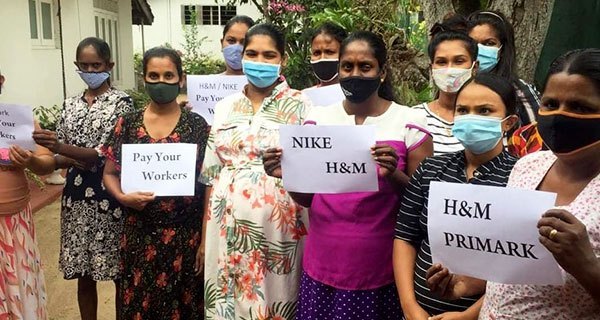Garment textile exports are a major component in Sri Lanka’s export economy. In addition to the income from migrant workers, the garment industry is Sri Lanka’s leading foreign exchange earning economy.
It also created hundreds of thousands of jobs. It is estimated that nearly a thousand garment factories are in operation in Sri Lanka.
The Covid 19 epidemic is now spreading uncontrollably in the country and globally. Garment industry workers can be cited as one of the most affected parties.
The garment industry employs workers without the social distance and other adequate health care needed to protect themselves from the epidemic.
More than a thousand workers at Brandex, one of Sri Lanka’s leading apparel companies, were infected with the virus when they were forced to work despite symptoms.
The factories in Horana and Agalawatta, which are South Asia’s largest multinational apparel manufacturer, were temporarily closed following the discovery of corona virus infections, but the factory owners reopened soon after.
Workers have had to report to work despite fears of being infected with the virus as the government, including the president, has decided to carry out normal activities while controlling the epidemic.
Various task forces set up by the government have issued various guidelines to pretend that they care about the well-being of workers, but they are limited to a paper.
No matter how many labor laws there are in the country, they have little effect on garment workers. These employees are entitled to a minimum monthly salary of Rs. 13,000-18,000.
This salary is not enough for those who come from far away places to stay in the boarding rooms of the city and make a living in the midst of various difficulties to meet even their basic needs.
So they turned to earning a living, as well as earning a living. But now attendance allowances and all other incentives have been cut and many factories are only paying their employees the basic salary.
Garment owners take advantage of their weaknesses and abuse their labor.
Garment workers come to work on company buses. They get on the bus from different places and travel by bus without any social distance. Next, they rush to sign on the fingerprint machines. They are also unable to maintain social distance while doing the job.
In order to cover the target, they need to work closely with other employees. The masks they wear are also not in good condition. They usually wear face masks made from the fabric left over after sewing.
Many workers say that the basic facilities provided at the time of employment are minimal. Workers have to wait hours to use toilets because the toilet system is not adequate. They are also not properly maintained.
Workers have also been forced to work on Saturdays and Sundays without holidays.
Despite the epidemic, many factory owners have decided not to pay the December bonus, despite efforts by the factory to increase production by bringing in workers.
Even as the virus spreads across the country, the garment factory administration continues to employ workers, relentlessly exploiting their labor, providing adequate health care, transportation, food and beverages, and cutting wages.
